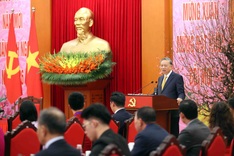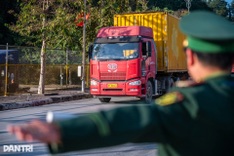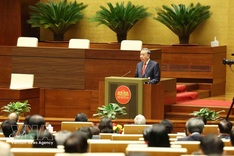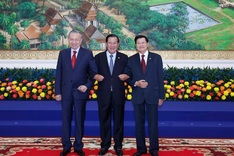
Minister-Chairman of the Government Office Tran Van Son speaks at the press briefing on July 3. (Photo: VNA)
Vietnam’s economy outperformed expectations in the first half of 2025, with gross domestic product (GDP) growth likely to exceed projections by 0.2 to 0.3 per cent, according to Tran Van Son, Minister-Chairman of the Government Office.
Speaking at a press briefing on 3 July to announce the outcomes of the monthly Cabinet meeting and a nationwide online conference with 34 provinces, cities, and more than 3,300 communes and wards, Son said second-quarter GDP was estimated at 7.67 per cent, bringing the six-month growth rate to 7.31 per cent. However, updated data as of 30 June suggests the actual figure could be higher, driven by improvements in industrial production, budget revenue, macroeconomic stability, and inflation control.
The Ministry of Finance reported that the manufacturing and processing sector expanded by 10 per cent in the first half. Exports rose by 14.4 per cent, resulting in a trade surplus of approximately USD 7.63 billion. Total retail sales of goods and services increased by 9.3 per cent.
Total social investment rose by 9.8 per cent in the same period, while registered foreign direct investment (FDI) reached USD 21.5 billion, up 32.6 per cent year-on-year — the highest level since 2009. Disbursed FDI amounted to more than USD 11.7 billion, representing an 8.1 per cent rise.
The business landscape also showed resilience, with 152,700 new and returning enterprises entering the market in the first six months, 20 per cent more than the number of businesses that exited during the same period.
Looking ahead, Son noted that the government has outlined key tasks for the second half of the year. These include monitoring the implementation of the two-tier local government model, enforcing decentralisation policies to ensure timely guidance and resolution of local bottlenecks, and streamlining administrative procedures.
Maintaining macroeconomic stability remains a top priority. The State Bank of Vietnam has been instructed to apply rational monetary policies, manage interest and exchange rates effectively, and ensure sufficient capital for production and business activities.
The government also aims to accelerate public investment disbursement, foster new growth drivers, leverage 17 existing free trade agreements, and pursue new trade partnerships. Son emphasised the target of completing at least 3,000 kilometres of expressways and more than 1,000 kilometres of coastal roads by the end of the year.
All ministries, agencies, and local governments have been urged to address longstanding obstacles, prevent waste, and push forward with administrative reform, he added.




















